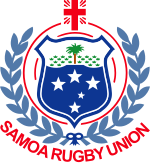Manu Samoa
 |
|
| Nickname(s) | Manu Samoa |
|---|---|
| Emblem | Southern cross |
| Union | Samoa Rugby Union |
| Head coach | Alama Ieremia |
| Captain | David Lemi |
| Most caps | Brian Lima (64) |
| Top scorer | Earl Va'a (172) |
| Top try scorer | Brian Lima (29) |
| Home stadium | Apia Park |
| World Rugby ranking | |
| Current | 14 (as of 21 November 2016) |
| Highest | 7 (2013) |
| Lowest | 15 (2016) |
| First international | |
|
Samoa 0–6 Fiji (Apia, Samoa; 18 August 1924) |
|
| Biggest win | |
|
Samoa 115–7 Papua New Guinea (Apia, Samoa; 11 July 2009) |
|
| Biggest defeat | |
|
New Zealand 101–14 Samoa (New Plymouth, New Zealand; 3 September 2008) |
|
| World Cup | |
| Appearances | 6 (First in 1991) |
| Best result | Quarter-finals, 1991, 1995 |
| Website | www.manusamoa.com |
The Samoa national rugby union team (also known as Manu Samoa) is the men's representative side of Samoa in rugby union. The Samoa Rugby Union is owned by the affiliated rugby unions of Samoa. The name Manu Samoa is in honour of a famous Samoan warrior. They perform a traditional Samoan challenge called the siva tau before each game. Samoa Rugby Union were formerly members of the Pacific Islands Rugby Alliance (PIRA) along with Fiji and Tonga. They are ranked 12th in the world.
Rugby was introduced to Samoa in the early 1920s and a governing body was soon formed. The first international was played as Western Samoa against Fiji in August 1924. Along with Tonga, these nations would meet regularly and eventually contest competitions such as the Pacific Tri-Nations – with Western Samoa winning the first of these. From 1924 to 1997 Samoa was known and competed as Western Samoa.
Samoa have been to every Rugby World Cup since the 1991 tournament. That tournament, along with the 1995 competition saw them make the quarter-finals. Under their new coach, the All Blacks legend Michael Jones (himself of Samoan descent and a Samoan international), Samoa competed in the 2007 Rugby World Cup. However, Samoa had a dismal World Cup campaign, winning only one match and finishing fourth in their group. Samoa showed an improved performance at the 2011 Rugby World Cup, winning two matches by comfortable margins, and losing close matches to South Africa and Wales. The players do not train on Sundays because many of the team are devout Christians.
...
Wikipedia
